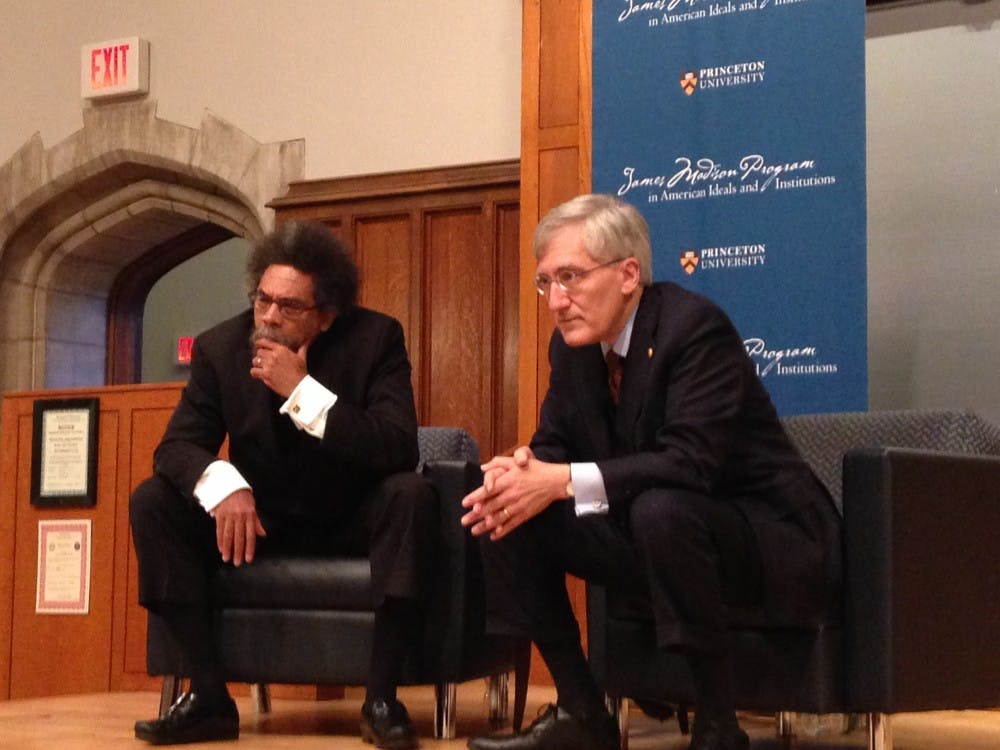University professors Robert George and Cornel West GS ’80 discussed the goals of liberal arts education at a lecture on Oct. 10, stating that its mission is for people to pursue intellectual truths, rather than just using it as a means to an end.
The audience was composed of professors, students, alumni, and academics from both on and off campus, filling up the seats long before the starting time.
The Dean of the College introduced the talk by addressing the problem of “liberal arts, as the foundation of education, being under attack.”
George started with an autobiography of his family’s humble origin. Education was very important in his family.
“[My parents] saw it as a ticket to social economic success,” he said.
But he later came to appreciate liberal arts education’s “inherent, non-instrumental values” over its instrumentals, “the importance of not reducing your education at Princeton to purely instrumental purposes,” George said.
West continued the dialogue by describing deep education as a product of learning how to die. The process of casting away and disposing one’s previous stands and ideas is the process of dying, he said. He saw it as a chance to reevaluate, sometimes leading to changes and sometimes to reinforcement.
West acknowledged that, as humans, we will all be connected to some presuppositions and dogmas. However, he said the purpose of liberal arts education is all about the “willingness to look outside of the dominant paradigms.”
George then continued with the topic of courage in liberal arts education.
“Liberal arts education can only be pursued if you are open to truth... and if you’re willing to face the possibility that you might be wrong. And that is scary," George said to the audience.
He talked about the societal pressure of conformation. He said it is pressing people to compromise their integrity, restraining their freedom of thought and integrity. In situations of differing opinions, George urged the audience to assess these arguments with open minds, and be willing to change their positions.
“[Deep education] is not just having all the information correct, not just skill acquisitions. Knowledge is not just facts,” George said. “Deep education is not on the check-box level. It is exploring ‘why,’ understanding and completing arguments that intellectual and well-informed people make.”
They went on to the subject of the meaning of smartness in society. West discussed the controversy of cultural smartness, stating that, to be included in the “provincial circle of cultural smartness” is to exclude the possibility of digging deeper into education by raising ideas and questions that challenge the “obvious.”
Excellence, wealth, and acceptance by the society, especially by people of fame and authority, are what mainly motivate young people toward education today. George questioned if that is what life is all about. They discussed pre-professional pressure from society and family that prevents students from seeking deeper education in fields that they truly love.
George then posed a question: What does one get from mustering up the courage to pursue a subject one loves that is far from professional plans?
“I think you get something called self-mastery,” George said.
West and George agreed that the control of self is necessary in order to then surrender oneself to the pursuit of truth, and deep education.
In the end, the professors opened up the floor for questions.
“I felt like it [the lecture] is something that gave me new perspective into what Princeton should be,” said Ben Press ’20 after the talk, “the pursuit of knowledge being the ultimate goal.”
George, the University McCormick Professor of Jurisprudence, is the director of the James Madison Program in American Ideals and Institutions. He has served important positions on various national committees, such as the U.S. Commission on International Religious Freedom and the U.S. Commission on Civil Rights. West, Class of 1943 University Professor in the Center for African American Studies, Emeritus, is a Senior Scholar of the James Madison Program. He has also written over 30 critically acclaimed texts on race and democracy.
The lecture, entitled “What is the Point of Liberal Arts Education?” was part of the James Madison Program, and took place at 50 McCosh Hall on Monday, Oct. 10, at 5:00 p.m.








